Theology & Church History Department
TCH501‒ Introduction to Eschatology
Required for MDiv. Elective for DMin― 3 credits, sizable. *FREE COURSE for students or guests. No Prerequisite.
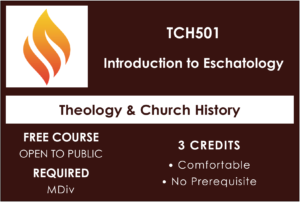 Sword & Spirit Seminary is excited to announce that Dr. Irvin Baxter of End Time Ministries graciously allowed us to offer his 14-lesson Understanding the End Time series to you free of charge (a $159 value).
Sword & Spirit Seminary is excited to announce that Dr. Irvin Baxter of End Time Ministries graciously allowed us to offer his 14-lesson Understanding the End Time series to you free of charge (a $159 value).
Understanding End Time Curriculum— 14 HOUR-LENGTH VIDEO LESSONS:
• United States Discovered in the Bible • New World Order is World Government • Islam in Bible Prophecy– The Four Horsemen
• WWIII– Entrance Ramp for the Antichrist • Israel’s God-Given Destiny • Israel– God’s Prophetic Time Clock • Holy Roman Empire Reborn
• The Antichrist and the False Prophet • 666– Mark of the Beast • The Coming One-World Religion– Part 1
• The Coming One-World Religion– Part 2 • The 7 Trumpets • The Second Coming • Kingdom of God.
This course includes all videos and course materials including quizzes and forum discussions. Course may be re-accessed or retaken as many times as desired. School Enrollment NOT Required. Non-SSS students may choose to bypass the quizzes. DETAILS
TCH502‒ Introduction to Classic Christian Theology
Required for MDiv― 3 credits, easy . No Prerequisite.
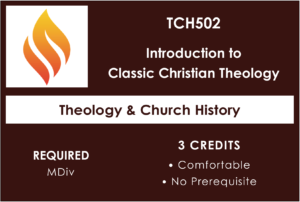 Knowing the fundamentals of Christianity helps us understand who God is, what He’s done, how we can expect him to work in our lives, and what He expects of us. Theology is in fact essential for followers of Christ‒ in some cases serving as the only mechanism protecting them from forsaking their faith. We need to know Bible doctrine in order to recognize its many distinctives as compared to competing faiths, and teach them to others.
Knowing the fundamentals of Christianity helps us understand who God is, what He’s done, how we can expect him to work in our lives, and what He expects of us. Theology is in fact essential for followers of Christ‒ in some cases serving as the only mechanism protecting them from forsaking their faith. We need to know Bible doctrine in order to recognize its many distinctives as compared to competing faiths, and teach them to others.
And though the study of theology may seem as if it will be overwhelming or boring, a simplified approach makes it not only doable, but enjoyable. This concise distilled introduction to essential doctrines helps students treasure the unchanging pillars of the Christian faith.
This course breaks down the task into minimal doctrinal topics. Each of the ninety-four chapters (2-4 pages each) in this small book explores a different doctrine in a way that is concise, easy to understand, and historically rooted. DETAILS
TCH503‒ Overview of Church History
Elective for MDiv or DMin― 3 credits, rigorous. No Prerequisite.
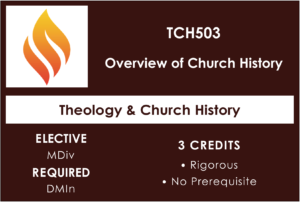 Knowledge of the key events and people in our Christian history really shouldn’t be optional, because the stories of the faithfulness of God’s people and the faithfulness of God are uniquely inspiring and provide unequaled perspective for our lives and the times we live in.
Knowledge of the key events and people in our Christian history really shouldn’t be optional, because the stories of the faithfulness of God’s people and the faithfulness of God are uniquely inspiring and provide unequaled perspective for our lives and the times we live in.
The challenge, however, is finding a resource which proves engaging by making the stories come alive, yet condensed into one manageable course.
This course solves that dilemma by neatly summarizing the most important events in Christian history from the time of Jesus to today in 12 easy chapters, making the course refreshingly enjoyable for believers from all walks of life. The colorfully illustrated and well-structured textbook presents key events, people and terms every Christian should know, timelines, worksheets, websites, photos, maps and illustrations. It was described by J I Packer as “…a beautifully simple, beginner-friendly telling of Christian history, a precious heritage.” Video lessons additionally help with engagement and retention.
There’s no doubt you will benefit from (as well as enjoy) the book and the accompanying videos. A must-take course that’s not required. DETAILS
TCH504‒ God’s Sovereignty and Man’s Free Will
Elective for MDiv or DMin― 3 credits, comfortabe. Prerequisite: TCH502‒ Introduction to Classic Christian Theology
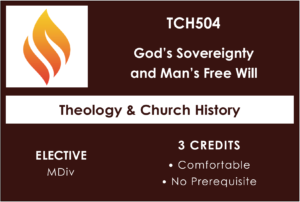 The debate regarding divine election vs. free will is of utmost importance to the church today. Many Christians are in constant debate over the extent to which Calvinism or Arminianism is valid, wondering what is true and this issue can personally affect them.
The debate regarding divine election vs. free will is of utmost importance to the church today. Many Christians are in constant debate over the extent to which Calvinism or Arminianism is valid, wondering what is true and this issue can personally affect them.
Calvinism emphasizes the absolute sovereignty of God in all aspects of salvation and life, teaching that God predestines individuals for salvation or condemnation according to His divine will, with salvation being entirely the result of God’s grace rather than human effort or decision.
Arminianism emphasizes the compatibility of God’s sovereignty with human free will, teaching that salvation is available to all through Christ’s atoning sacrifice, and individuals must freely choose to accept or reject God’s grace, which can be resisted and is not imposed unconditionally.
This course is useful no matter where a student stands on the debate or whether they have an initial opinion at all. It visits both views and challenges students to consider how the two sides of this coin can harmonize, examining the question of how our beliefs about free will affect our perceptions regarding love, personal responsibility, and purpose.
In examining both views, students are equipped to form their own perspectives based on study and critical thinking skills. DETAILS
TCH505‒ Historic Premillennialism
Elective for MDiv or DMin― 3 credits, rigorous. Prerequisite TCH501― Introduction to Eschatology
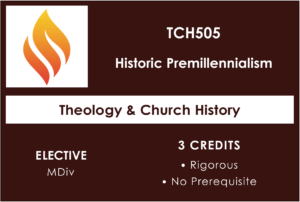 Many evangelical leaders and congregants‒ having learned the basics of eschatology from contemporary and popular sources‒ accept dispensational premillennialism, with its distinctive teachings about the timing of ecological events. But did you know that the concept of a pretribulation rapture, for instance, originated just short of 200 years ago?
Many evangelical leaders and congregants‒ having learned the basics of eschatology from contemporary and popular sources‒ accept dispensational premillennialism, with its distinctive teachings about the timing of ecological events. But did you know that the concept of a pretribulation rapture, for instance, originated just short of 200 years ago?
There is great danger in accepting theologies without cross-examination. And confidence through study is especially called for in this question, because our beliefs can significantly affect our responses to each other and this tumultuous world. This course takes students deeper into the subject by examining the historical understanding of the end times and the return of Christ; that is, the view widely prevalent throughout 18 centuries of church history.
The contributors to this course (all respected scholars in their respective fields) suggest that classic premillennialism provides a coherent and viable approach to understanding eschatology. Their studies, which examine eschatology from biblical, theological, historical, and missiological approaches, provide a broadly credible argument for returning to the perspectives of historic premillennial eschatology.
Because a vast amount of material on the pretribulation rapture is publicly available, this course is included to provide students with a well-supported alternative that offers a fresh and less familiar perspective while fostering critical thinking. DETAILS
TCH506‒ Catholicism Under the Hood for Protestants
Elective for MDiv or DMin― 2 credits, easy. No Prerequisite.
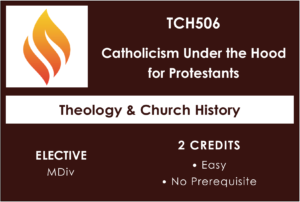 The Roman Catholic faith is one of the world’s most widespread religious traditions, yet the unique aspects of Roman Catholicism elicit perennial questions from adherents and outsiders alike.
The Roman Catholic faith is one of the world’s most widespread religious traditions, yet the unique aspects of Roman Catholicism elicit perennial questions from adherents and outsiders alike.
Though Catholicism was visited in the Comparative World Religions Courses, some students may desire further study.
Questions tend to fall into three major categories: historical backgrounds, theological matters, and personal relationships. Using Catholic Church documents and the writings of Catholic scholars, this course distills the teachings of Catholicism around 40 common questions about Catholic foundations, beliefs, and practices.
The question-and-answer format guides readers to the issues that concern them, including:
• Where do Roman Catholic and Protestant beliefs differ?
• What happens during a Roman Catholic Mass?
• How does Roman Catholicism understand the biblical teaching about Mary?
• Who are the saints and what is their role?
• How do the Catholic and Protestant versions of the gospel differ?
Rather than testing students on the detailed content of the 332-page textbook through quizzes or exams, this course invites meaningful engagement through sustained reflection and personal interaction with the material. Students will respond in writing to the Reflective Questions found at the end of selected chapters, specifically focusing on 19 of the 40 questions/chapters, which covers about 40% of the material. The rest of the book is there for future reference. This approach encourages thoughtful engagement with key themes, allowing students to process ideas deeply without the pressure of memorization. DETAILS
Doctorate-Level Courses
TCH601‒ The Women in Ministry Controversy
Elective for MDiv or DMin― 4 credits, rigorous. No Prerequisite.
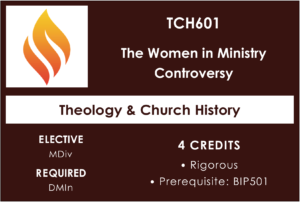 Do the well-known New Testament passages regarding the roles of women (1 Cor 11:1-16, 1 Cor 14:34-35, 1 Tim 2:9-15, Eph 5:18-33) teach the subordination of women in church universally and throughout time and culture? Are there other passages that speak to the question?
Do the well-known New Testament passages regarding the roles of women (1 Cor 11:1-16, 1 Cor 14:34-35, 1 Tim 2:9-15, Eph 5:18-33) teach the subordination of women in church universally and throughout time and culture? Are there other passages that speak to the question?
This course provides students detailed in-depth studies by New Testament scholars with outstanding credentials in biblical interpretation of these and other relevant texts concerning gender. Utilizing sound and imperative exegetical and hermeneutical principles often ignored, this study digs deep into these vital issues.
The course ‒both relevant and important in today’s Christian culture‒ brings needed perspective and insight utilizing 2 books.. one authored by a man, one by a woman. As a bonus, one of the textbooks addresses in detail Marriage in the Letters of Paul, which students may study on their own. DETAILS
TCH610.1‒ Introduction to Systematic Theology: Scripture
Elective for MDiv or DMin― 1 credit, easy. No Prerequisite.
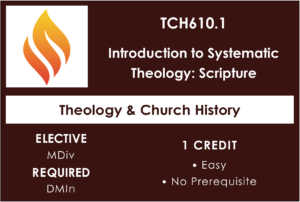 A strong understanding of Bible Doctrine is mandatory for ministers of the gospel, especially for those earning Doctorates. Though our course TCH502 does a fine job of introducing Classic Christian Theology, a systematic study is the next step.
A strong understanding of Bible Doctrine is mandatory for ministers of the gospel, especially for those earning Doctorates. Though our course TCH502 does a fine job of introducing Classic Christian Theology, a systematic study is the next step.
Systematic Theology: An Introduction to Biblical Doctrine is the most widely used seminary textbook and theological reference across denominational and non-denominational lines. With 1616 pages, the volume is much more extensive that the 304-page curriculum we employ in our MDiv-required course. Therefore, we wanted to introduce this resource by offering this 2-credit course covering just one section of the book.
This course simply INTRODUCES students to this resource by focusing only on a small segment from Grudem’s book. The course addresses questions like: What is systematic theology? Why should Christians study it? How should we study it? What belongs in the Bible and what does not belong? What are the 4 characteristics of Scripture? What do we need to know about them? How do we know that the Bible is God’s Word? Are there any errors in the Bible?
Students who enjoy this sample course will want to purchase this book as an essential reference‒ and may be interested in purchasing it’s companion: Historical Theology: An Introduction to Christian Doctrine: a Companion to Grudem’s Systematic Theology by Gregg R. Allsion (author of the textbook for our course: TCH507‒ Catholicism Under the Hood for Protestants.)
We suggest students purchase the Systematic Theology book‒ but because this is only a “sample” course pointing interested students to this theology resource‒ students may alternatively access at no cost the applicable text through a provided link.
Should students want to study Systematic Theology further, Sword & Spirit Seminary welcomes the submission of appropriate quiz questions for additional credit. DETAILS